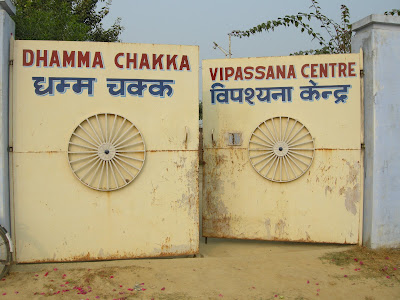
As many of you know, we had the amazing opportunity to take a 10 day course in Vipassana meditation in an ashram (monastery) located in Sarnath, India (the first place the Buddha taught after his enlightenment). It reminded us how, as Kelsi's friend Sharon put it, "different cultures have unique spiritual gifts that they have magnified and developed..." All in all, it was such a wonderful growth experience and SO HARD that we were both thinking on many occasions that we might not make it through the entire 10 days. Luckily we persisted to the end and found it extremely rewarding.
Vipassana meditation claims to be the original meditation teaching of Buddha. The teaching and the methodology bills itself non sectarian and claims it is not connected to any doctrines, dogma, beliefs, or truths. In short, Vipassana meditation aims for purification of the mind, which is achieved by three primary actions: (1) doing no harm to others, including a code of chastity and morality, (2) doing good for yourself and others, including a strict code of health, and (3) meditation by being aware of your bodily sensations and equanimously observing them.
Despite the supposed simplicity of the Vipassana meditation method, neither of us had ever meditated before, which made it surprisingly intense. We both had ideas of what meditation might be like: we had pondered things and thought about scriptures and life, but we didn't really know what to expect. In Vipassana meditation you don't think, you don't visualize, you don't chant. You simply sit and remain alert to your bodily sensations while not reacting with craving or aversion to the good or bad sensations. The reasoning behind this method is that human beings suffer enormously from their attachment and clinging to the sensations caused by the ultimately impermanent things of this world. By training the mind to simply be aware of sensations without reacting with attachment to them, we are able to let go of these attachments and experience life without misery.
This is a drastic oversimplification and inadequate explanation of a process which we experienced, so we recommend that you try something to get a small taste:
Find a quiet place where you can sit comfortably and close your eyes. Focus 100% of your attention on the openings of the nostrils and observe how the air passes in and out. Try to maintain your attention as long as you can. If you are anything like us and 99.9999...% of new meditators, you won't be able to maintain your absolute, 100% focus and awareness on this one simple task for more than 3-5 seconds without an errant thought in the mind (even the thought of how focused you are counts as an errant thought). In other words, your mind is completely out of control, and Vipassana meditation tells us that we have become slaves to our thoughts, which we have little control over, and this is what causes human misery and suffering.
The course that we took on Vipassana helped us to build up mental strength of awareness by meditating 10-12 hours per day and living as monks and nuns for the 12 days while we were there: complete silence (no words, looks, gestures, etc.), segregation of sexes, vegetarian diet and no eating after 12 pm, wake up at 4 am and lights out at 9:30pm, and meditation all day. You can shower, wash clothes, etc. during the 2 hours of daily rest only. They house and feed you the whole time and charge nothing. You are free to make a donation at the end at your option and discretion with zero obligation.
It was truly a remarkable and memorable experience. It was amazing how such a simple practice of awareness led us to feel so energized about life and full of goodwill towards others. The Vipassana organization has facilities around the world (including several in the US). If you're interested in learning more about what we experienced or if you're interested in learning more about meditation, we recommend you to look into the website: http://www.dhamma.org/ We are so fortunate to have stumbled into this technique and definitely think that Vipassana is on to something and that meditation is a good practice for establishing personal peace.
4 comments:
No wonder I haven't been able to make contact with you. I'm glad you two are living life. Our blog http://caseycookfamily.blogspot.com
I still say I could never do it...The no talking alone would kill me.
Wow! That sounds intense. Must've been a life-changing experience.
I noticed a word on a gate, "Chakka"; Now I would imagine most of India living up to the way I would pronounce that word. You are quite remarkable for enjoying this experience!
Post a Comment